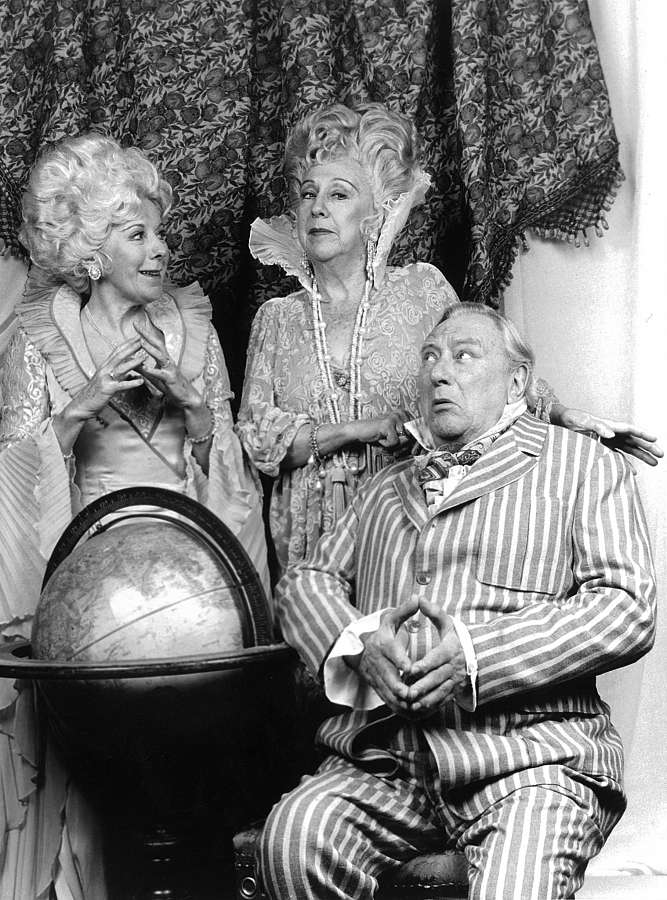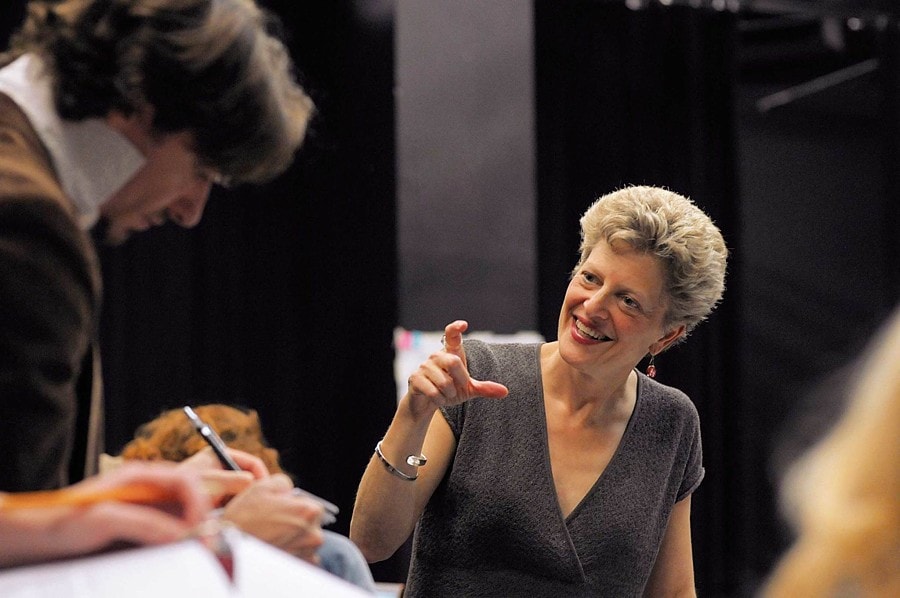It was lucky that the spring of my first season brought some lighter comedies to the fore, beginning with Albert Takauszakas’s production of Dinner at Eight, a play I thought would beautifully suit what was left of the A.C.T. company. The band of 40-plus actors who had been lucky enough to receive seasonal contracts at A.C.T. had diminished over the years, as actors left for Los Angeles and New York and A.C.T.’s ability to sustain long-term contracts waned. But a few of the truly great actors from A.C.T.’s early days, including Sydney Walker, William Paterson and Ken Ruta, were still in town, and I knew that it would mean a great deal to our audience if they were part of my programming. The work of the great Sydney Walker was a particular inspiration.
By the time we got to Molière’s The Learned Ladies, which mercifully closed the season, Sydney’s astonishing comic timing and antic openhearted collaboration with Jean Stapleton brought the house down and temporarily reassured the audience that I was not the violent iconoclast that they had suspected. I will never forget Sydney standing at the lip of the stage after the show, exhorting the audience to re-subscribe by promising them excitement “and just a little bit of controversy,” with an enormous twinkle in his eye.

Toward the end of that first season, I went to Europe to fulfill an obligation I had entered into long before the A.C.T. job had presented itself: I was directing the world premiere of a new Steve Reich–Beryl Korot opera entitled The Cave at the 1993 Vienna Festival. The moment work on The Cave began, I realized to my great sadness that I felt more at home among that group of wild musicians, none of whom was known to me, than I had been at my own theatre for the past year. The attacks and frustrations had taken their toll: I felt beaten up and discouraged. I was homesick for the close downtown community of New York theatre that had sustained and supported me at CSC, and I was in open warfare with my managing director, John Sullivan.
Indeed, I later discovered that John had asked many senior staff members to join him in signing a petition to the board to have me removed. To be fair, we had lost more than a million dollars on my first season, in part because the budget had never been realistically presented to me and in part because of an economy in prolonged recession. Now we were faced with the need to renew subscribers who were clearly angry and disaffected, and to continue to try to raise capital dollars from donors who were not yet sure what the “new” A.C.T. was going to look like.
Had only one of the litany of first-year controversies happened, or had they happened in the context of a stable artistic enterprise, each would have blown over quickly. But I was new, young, untested, female and from New York, and every move I made was read as an indicator of further dangers ahead. The economy was weak, and the possibility of raising the $32 million required to rebuild the Geary seemed remote. I had a demoralized staff with limited experience in fundraising or marketing. Benny Ambush and Richard Seyd were doing their best, but they too were outsiders and overwhelmed by the tide of events.
I’m sure that John had only A.C.T.’s best interests in mind, and that supporting a maverick new artistic director like myself was a challenge he didn’t believe would bear fruit. But the partnership had become impossible. When I returned from Vienna, I told him that I was aware of his desire to run the theatre alone and that I thought it was most appropriate for him to go to the board and give them the choice. Either he would stay or I would, but I could no longer envision a scenario in which we stayed together. To my great surprise, when he went to the board and proposed that he be left in charge of the organization, the board demurred, indicating that they had chosen to hire an artist and that they would stand by their decision.
I heard of this decision at a meeting at Alan Stein’s stunning Russian Hill apartment on a sunny day in June. We sat in the picture window of his living room, overlooking the entire Bay. I watched the sailboats pass by below and suddenly felt nostalgic for all that I would miss when I left the Bay Area. Alan served us coffee. He sat down, smiled and said, “Look, Carey. It’s been a hard year. Change is extremely difficult. We all understand that. But now that you’ve done the hard part, it’s time to see it through.”
It took me a moment to realize he was asking me to stay on. I couldn’t fathom how this gentle, intelligent man had the courage to stick with a renegade choice who had caused so much pain and uproar over the past year. But Alan was unfazed. He liked much of the work that he had seen. He liked my energy and enthusiasm. He liked my willingness to talk to the audience, my passion for writing about the work, my eagerness to ask anyone and everyone for support, my facility with public speaking. But most of all, I think he was banking on my spirit. A.C.T. had been through so many near-death experiences in its history, he believed that only a young person of indomitable spirit could keep it alive. We had no cash flow, no theatre, no easy remedies. But somehow, he was willing to stick by me.
I walked out of Alan’s apartment into the hot June sunshine in a daze, trying to understand what had just happened. From there, I entered the next chapter of my life at A.C.T. as sole CEO, a position I have never relished and never sought again. I dove into preparations for my second season.
As a fitting conclusion to that annus terribilis, we printed a subscription renewal brochure that was covered in quotes from the letters we had received over the course of the year. I leavened the most hostile ones with the occasional positive remark, but I let the criticisms stand. The audience must have felt heard and therefore somewhat vindicated, because, ironically, a surprisingly large percentage re-subscribed. I learned a critical thing about the Bay Area: It is a community filled with opinions, ready to take umbrage at almost anything but equally ready to go the distance when engaged. Those subscribers cared about A.C.T. Their outrage was a sign of their affection, bizarre as that might seem.
Certainly no one could say it had been a boring season, quipped the brilliant philanthropist Barbro Osher, who had supported the organization for so many years. It was clear that this was no longer “your father’s A.C.T.” My first season had served if nothing else to expose all the cracks in the infrastructure of the organization. But we had survived, and now, apparently, I had to stay and see it through.
This essay is excerpted from Beautiful Chaos: A Life in the Theatre, Perloff’s forthcoming book.


